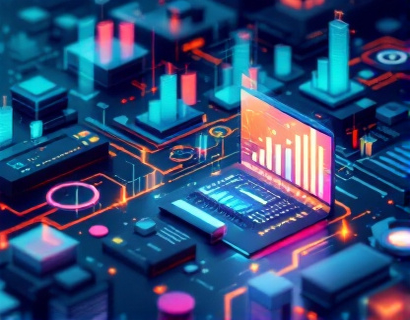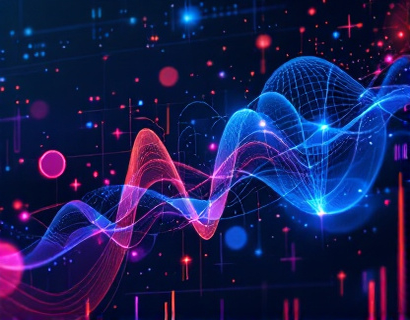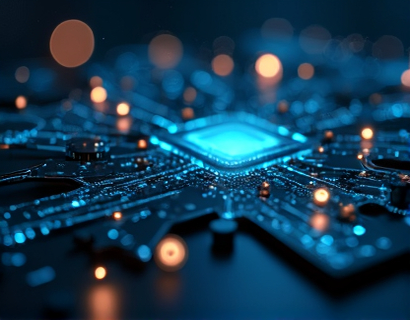Revolutionizing User Experiences: The Convergence of AI and Crypto
The integration of artificial intelligence (AI) and cryptocurrency is ushering in a new era of digital innovation, fundamentally transforming how users interact with technology. This convergence is not just a technological advancement but a paradigm shift that promises to redefine the very essence of digital experiences. By combining the decentralized and secure nature of blockchain with the intelligent and adaptive capabilities of AI, we are witnessing the creation of more efficient, intuitive, and personalized digital environments.
The foundation of this revolution lies in blockchain technology, which provides a secure, transparent, and immutable ledger for transactions. This technology underpins cryptocurrencies, enabling peer-to-peer transactions without the need for intermediaries. When AI is integrated into this ecosystem, it enhances the functionality and user experience by analyzing vast amounts of data to predict user needs, optimize processes, and ensure security.
Enhanced Security Through AI and Blockchain
One of the most significant benefits of combining AI and cryptocurrency is the enhanced security it offers. AI algorithms can detect and respond to potential threats in real-time, significantly reducing the risk of fraud and cyber attacks. Blockchain's inherent security features, such as cryptographic hashing and decentralized consensus mechanisms, are further bolstered by AI's predictive analytics. This dual-layer security ensures that user data and transactions are protected, fostering trust and confidence in digital platforms.
For instance, AI-driven security systems can monitor transaction patterns and identify anomalies that may indicate malicious activity. These systems can automatically trigger alerts and implement protective measures, such as temporary transaction halts or enhanced verification processes. This proactive approach to security is a game-changer for users who are increasingly concerned about the safety of their digital assets.
Personalized User Experiences
AI's ability to analyze and interpret vast datasets allows for the creation of highly personalized user experiences. In the context of cryptocurrency and digital services, this means that users can enjoy tailored recommendations, customized interfaces, and streamlined workflows. AI algorithms can learn from user behavior and preferences, adapting the platform to meet individual needs seamlessly.
For example, a digital wallet powered by AI can suggest optimal investment strategies based on a user's historical data and market trends. It can also automate routine tasks, such as rebalancing portfolios or managing multiple assets, freeing users to focus on more strategic decisions. This level of personalization not only enhances user satisfaction but also increases the efficiency and effectiveness of digital services.
Intelligent Automation and Smart Contracts
Smart contracts, self-executing contracts with the terms directly written into code, are a cornerstone of blockchain technology. When combined with AI, smart contracts become even more powerful, capable of executing complex tasks with precision and autonomy. AI can optimize the logic within smart contracts, ensuring they adapt to changing conditions and user needs in real-time.
Consider a scenario where a smart contract is used for automated trading. AI can analyze market data, predict price movements, and adjust the trading parameters of the smart contract accordingly. This intelligent automation reduces the need for manual intervention, minimizes human error, and maximizes the efficiency of trading operations. Users benefit from faster, more reliable, and more profitable trading experiences.
Enhanced User Interfaces and Experiences
The integration of AI and cryptocurrency is also revolutionizing user interfaces and overall user experiences. AI-driven design tools can create intuitive and responsive interfaces that adapt to different devices and user preferences. Natural language processing (NLP) enables voice and text-based interactions, making digital services more accessible and user-friendly.
For instance, a cryptocurrency exchange can use AI to develop a user interface that learns from user interactions, suggesting frequently used functions and simplifying complex processes. NLP-powered chatbots can provide instant support and guidance, answering queries and resolving issues in real-time. These advancements not only improve usability but also enhance the overall user experience, making digital platforms more engaging and efficient.
Decentralized Applications and AI-Enhanced Services
Decentralized applications (dApps) are at the forefront of the AI and cryptocurrency convergence. These applications leverage blockchain's decentralized nature and AI's intelligent capabilities to offer innovative solutions across various industries. AI can enhance dApps by providing advanced analytics, predictive modeling, and personalized services, all within a decentralized framework.
In the finance sector, AI-enhanced dApps can offer sophisticated lending and borrowing platforms that assess creditworthiness with greater accuracy and speed. In the healthcare domain, AI-driven dApps can analyze medical data to provide personalized treatment recommendations, all while ensuring data privacy and security through blockchain. These applications demonstrate the transformative potential of combining AI and cryptocurrency to create decentralized, intelligent, and user-centric services.
Challenges and Considerations
While the integration of AI and cryptocurrency offers numerous benefits, it also presents challenges that must be addressed. One of the primary concerns is the technical complexity involved in developing and maintaining these systems. Developers need a deep understanding of both AI and blockchain technologies to create robust and secure applications.
Another challenge is the regulatory landscape. As AI and cryptocurrency continue to evolve, regulatory frameworks are still catching up. Ensuring compliance with existing laws and advocating for clear and supportive regulations is crucial for the sustainable growth of these technologies. Additionally, there is a need for education and awareness among users to fully harness the potential of AI and cryptocurrency-driven digital experiences.
Future Prospects
The future of AI and cryptocurrency integration holds immense promise. As technology advances, we can expect even more sophisticated and seamless integrations that further enhance user experiences. The development of interoperable blockchain networks and AI frameworks will enable more diverse and collaborative applications, breaking down silos and fostering innovation.
Moreover, the rise of edge computing and 5G networks will facilitate faster and more reliable data processing, making AI-driven services more responsive and efficient. The combination of these technologies will pave the way for a new generation of digital platforms that are not only more secure and personalized but also more intelligent and adaptive.
In conclusion, the convergence of AI and cryptocurrency is revolutionizing user experiences by providing enhanced security, personalized interactions, intelligent automation, and innovative applications. As tech innovators and early adopters, embracing these advancements will be key to staying ahead in the rapidly evolving digital landscape. The future is bright, and the possibilities are endless.










































